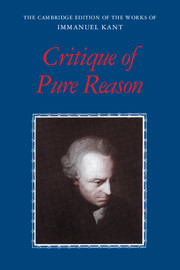Book contents
- Frontmatter
- Contents
- General editors' preface
- Acknowledgments
- Introduction
- Immanuel Kant, Critique of Pure Reason
- Table of Contents
- Motto (added in the second edition)
- Dedication
- Preface (to the first edition)
- Preface to the second edition
- Table of Contents (as in the first edition)
- Introduction (as in the first edition)
- Introduction (as in the second edition)
- I Transcendental doctrine of elements
- Division two. Transcendental dialectic
- II Transcendental doctrine of method
- Editorial Notes
- Glossary
- Index
Introduction (as in the first edition)
from Immanuel Kant, Critique of Pure Reason
- Frontmatter
- Contents
- General editors' preface
- Acknowledgments
- Introduction
- Immanuel Kant, Critique of Pure Reason
- Table of Contents
- Motto (added in the second edition)
- Dedication
- Preface (to the first edition)
- Preface to the second edition
- Table of Contents (as in the first edition)
- Introduction (as in the first edition)
- Introduction (as in the second edition)
- I Transcendental doctrine of elements
- Division two. Transcendental dialectic
- II Transcendental doctrine of method
- Editorial Notes
- Glossary
- Index
Summary
The idea of transcendental philosophy.
Experience is without doubt the first product that our understanding brings forth as it works on the raw material of sensible sensations. It is for this very reason the first teaching, and in its progress it is so inexhaustible in new instruction that the chain of life in all future generations will never have any lack of new information that can be gathered on this terrain. Nevertheless it is far from the only field to which our understanding can be restricted. It tells us, to be sure, what is, but never that it must necessarily be thus and not otherwise. For that very reason it gives us no true universality, and reason, which is so desirous of this kind of cognitions, is more stimulated than satisfied by it. Now such universal cognitions, which at the same time have the character of inner necessity, must be clear and certain for themselves, independently of experience; hence one calls them a priori cognitions: whereas that which is merely borrowed from experience is, as it is put, cognized only a posteriori , or empirically.
Now what is especially remarkable is that even among our experiences cognitions are mixed in that must have their origin a priori and that perhaps serve only to establish connection among our representations of the senses.
- Type
- Chapter
- Information
- Critique of Pure Reason , pp. 127 - 135Publisher: Cambridge University PressPrint publication year: 1998

